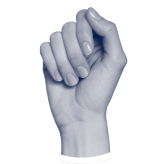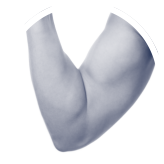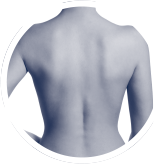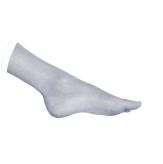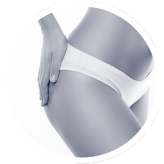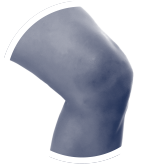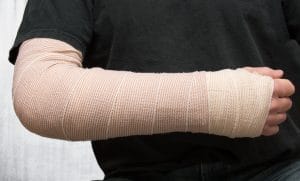
Degenerative disc disease is a common condition that can result in severe back pain. As we age, the discs between our vertebrae start to degrade. If you are experiencing pain due to degenerative disc disease, there are treatments available that can help relieve your pain and restore your mobility.
What is degenerative disc disease?
Degenerative disc disease is a condition that primarily affects the discs between the vertebrae in your spine. These discs act like shock absorbers or cushions that allow you to twist, bend, and move comfortably. Over time, these discs start to break down from everyday wear and tear. This degradation is normal, and almost all adults over the age of 40 show some level of spinal disc deterioration. In some people, however, it can cause pain, stiffness and reduced mobility. This is what’s known as degenerative disc disease. Degenerative disc disease is most common in older adults, and is slightly more common among women, those who suffer from obesity, and people with physically strenuous jobs.
Causes of degenerative disc disease
Age: As stated above, disc degeneration is a natural result of the aging process. As people get older, the intervertebral discs lose their water content and elasticity, making them thinner, less supportive, and prone to cracks. As a result, they are less able to absorb shock and provide cushioning between the vertebrae. This degeneration can lead to disc herniation, bulging, or thinning.
Genetics: Some people may be more genetically predisposed to developing degenerative disc disease than others. Some individuals may inherit structural or biochemical abnormalities in their spinal discs that make them more susceptible to degenerative changes.
Wear and Tear: Due to lifestyle or occupation, some people’s spinal discs undergo more wear and tear. Repetitive movements, excessive strain, and prolonged mechanical stress on the spine can contribute to degenerative disc disease. Jobs or activities that involve heavy lifting, bending, twisting, or repetitive motions can accelerate the degeneration of the intervertebral discs.
Spinal Injuries: Trauma or injuries to the spine, such as from accidents, falls, or sports-related activities, can cause damage. Injuries may lead to herniation, tears, or instability of the discs.
Smoking: Cigarette smoking is associated with a host of health problems and premature ageing, including increased degeneration of the intervertebral discs. Smoking can reduce the oxygen and nutrient supply to the discs, impair their ability to heal, and accelerate the degenerative process.
Obesity: Excessive weight and obesity can place additional stress and pressure on the spinal discs, leading to their degeneration. The extra weight can also disrupt the balance and alignment of the spine, contributing to disc wear and tear.
Poor Posture: Incorrect posture, such as slouching or sitting for long periods with poor spinal alignment, can increase the load on the intervertebral discs and contribute to their degeneration over time.
Lack of Exercise: Having a sedentary lifestyle and lack of regular exercise can weaken the muscles that support the spine; weak muscles are less able to protect the intervertebral discs from excessive stress, which can contribute to degenerative disc disease.
Symptoms of degenerative disc disease
The primary symptom of degenerative disc disease is back pain. You may feel sharp or constant pain in certain parts of your spine depending on where the degeneration is happening, but the most common areas are the neck (cervical spine) and lower back (lumbar spine). You might also experience pain in your buttocks and thighs.
Additional symptoms include:
Radiating pain – You may feel pain that radiates from your neck down your shoulders and arms, or from your back down your legs.
Nerve damage – Degenerative discs can put pressure on spinal nerves, leading to symptoms of nerve compression. Numbness, tingling, or a sensation of “pins and needles” may be felt in the areas innervated by the affected nerves.
Stiffness: DDD can lead to stiffness and reduced flexibility in the spine. Individuals may experience difficulty in bending, twisting, or turning the neck or back, leading to a decreased range of motion.
You may also experience pain that is worse when performing certain activities. For many people with degenerative disc disease, the pain is worse when sitting, bending, lifting, or twisting, and is relieved by movement like walking or by lying down.
Pain may last for a few hours or up to several days or weeks. It may become worse over time as the degeneration progresses.
How is degenerative disc disease diagnosed?
Degenerative disc disease can be diagnosed by an orthopaedic specialist from a combination of consultations and diagnostic image testing. Your spinal consultant may order tests such as an MRI, X-ray, or CT scan. These tests can show the state of your vertebrae and discs and any visible damage or degeneration.
These images alone are typically not enough to diagnose degenerative disc disease, as often people have changes on imaging but are relatively pain free, or vice versa, imaging can be clear, however the person is in excruciating pain. Therefore, your physician will also review your medical history and ask you a series of questions about your symptoms.
Questions might include how intensely and how frequently you experience pain, what activities aggravate or relieve it, how long you have been experiencing pain and whether it has worsened over time. They will also perform a thorough physical examination to assess your range of motion and muscle weakness and test the integrity of your peripheral nerves. They will also perform tests to make sure your pain is not attributable to other problems.
Treatment options
Your plan of care will depend on how severe your symptoms are, and the location and severity of the disc degeneration.
Medication
Your spinal consultant may initially look at trying to manage your pain with prescription or over the counter medications. These might include painkillers like ibuprofen and non-steroidal anti-inflammatory medication, also known as NSAIDs, steroids, and muscle relaxers.
At-home treatment
At-home treatments like exercise and regular stretching, or hot and cold pack treatments can also help to manage your symptoms. However, while these can provide some relief in the short term, they are typically not going to reverse chronic pain caused by disc damage.
Non-invasive medical treatment
Non-invasive treatment like physiotherapy can help increase your range of motion and improve your posture, which can help with back and neck pain. Physiotherapy can also strengthen the muscles surrounding the vertebrae, which will help to support the spine and put less pressure on the discs. Often, a combination of medication and physiotherapy is enough to provide relief. Treatment must be done consistently over a period of 6-8 weeks, and with a longer term management plan in place, in order for conservative treatment to be as effective as possible. In almost all cases, physiotherapy should always be your first line of treatment, and it will also play an important part in your recovery should you need spinal surgery.
Spinal Injections
If your symptoms are not settling, or if your pain is so severe that it is keeping you awake at night and you are not able to do any of your normal daily activities, then your consultant might suggest you have a spinal injection.
Spinal injections consist of a mix of steroid and local anaesthetic and are usually carried out under x-ray guidance, to ensure the correct disc or joint space is targeted. These injections can be very effective in reducing swelling and inflammation surrounding the injured disc, vertebral joint and nerve root.
Surgery
If these treatments are unsuccessful, your doctor may recommend surgery. Surgical procedures to relieve pain caused by degenerative disc disease include a spinal fusion, where two or more vertebrae are connected, or a discectomy which removes the disc altogether and replaces it with an artificial one. Surgery can provide long-term pain relief but must be accompanied by ongoing exercise and healthy habits.
Prevention
Disc degeneration is a natural part of the ageing process and cannot be prevented altogether. However, there are some steps you can take to help reduce your chances of developing back pain and slowing the progression of the degeneration process.
Maintain a Healthy Weight: Excess weight places additional stress on the spine and accelerates disc degeneration. By maintaining a healthy weight through a balanced diet and regular exercise, you can reduce the load on your spine and minimise the risk of degenerative disc disease.
Stay Active and Avoid a Sedentary Lifestyle: Leading an active lifestyle and avoiding prolonged periods of inactivity can help maintain spinal health. Incorporate regular movement and exercise into your daily routine to keep your spine flexible and strong. Engaging in regular physical activity helps strengthen the muscles that support the spine, improve flexibility, and enhance overall spinal health. Low-impact exercises such as walking, swimming, and yoga can be beneficial for maintaining spinal strength and mobility.
Practise Good Posture: Maintaining proper posture is important for spinal health. Ensure that your desk and work space is set up correctly, and if necessary get an ergonomic assessment done at work. Move regularly, and try not to sit in one position for a long period of time.
Lift Properly: Avoiding excess strain on your back and back injuries can help slow the progression of disc degeneration. When lifting heavy objects, use proper lifting techniques to minimise strain on your back. Bend at the knees, keep the object close to your body, and use your leg muscles to lift, rather than relying on your back.
Avoid Prolonged Sitting or Standing: Prolonged sitting or standing can put stress on the spinal discs. If your work involves sitting for long periods, take regular breaks to stretch, walk, or change positions. If you have a job that requires prolonged standing, try to find ways to take short sitting breaks or shift your weight to reduce strain on the spine.
Quit Smoking: Smoking has been associated with increased rates of disc degeneration. Quitting smoking can improve your overall health and potentially slow down the degenerative process in the intervertebral discs.
Manage Stress: Chronic stress can contribute to muscle tension and poor posture, which can put additional strain on the spine. Practice stress management techniques such as exercise, relaxation exercises, or mindfulness to reduce stress levels and promote overall well-being.
How can London Bridge Orthopaedics help?
At LBO we have two outstanding and highly experienced Spinal Consultants. We also have access to all of the latest and most up to date imagining and nerve tests, to ensure that you get a rapid and accurate recovery.
We work with some of the best and most highly skilled spinal physiotherapists, and we will make sure that you receive the best possible care and treatment outcomes, to get you back to doing all the activities that you enjoy.
London Bridge Orthopaedics
London Bridge Orthopaedics is based in the United Kingdom, with our new headquarters at The Shard. Looking for the latest and most efficient orthopaedic services? We’ve got you covered.
We are orthopaedic specialist consultants, and we will take good care of all your orthopaedic needs, whatever your injury.
Our highly qualified and experienced team offer exceptionally high-standard care that includes:
- Including the patient in all decision-making.
- Offering personalised patient care that suits your needs.
- Performing surgical procedures only when absolutely required and in your best interest.
For quality and effective treatment of spine problems, call London Bridge Orthopaedics on 0203 576 5296 or book an appointment online to get the best services today.


